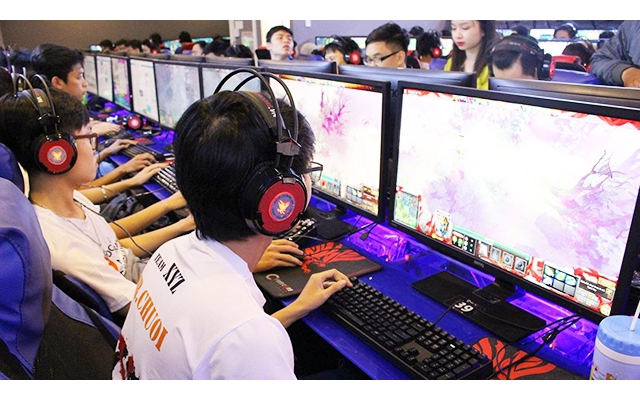 Society
Society

 |
| Teenagers are increasingly spending their time gaming in excess. — Photo suckhoedoisong.vn |
HÀ NỘI — A 21-year-old from Hà Nội was taken for treatment due to a state of unstable mental health after years of obsessive gaming.
The gaming addict, identified as P.M.Q, lost control over his behaviour, abandoned all tasks in real life and lived in a world of games most of the time.
He was treated at the National Psychiatric Hospital twice but has not recovered fully.
The patient's mother said he used to be a biotechnology student but had dropped out of school midway.
He suffered from childhood trauma when he was in the seventh grade due to the divorce of his parents. This was also when he started to spend lots of time playing online games, likely to escape the harsh reality around him.
At first, he played games for fun after getting invitations from his friends, then he increased his time on gaming as it relieved him from study stress and allowed him to make more friends.
Gradually, he played games day and night and some days spent 10 to 12 hours in front of the screen.
On days off, he spent the whole time playing games, eating instant noodles, and drinking energy drinks at his game desk.
Realising that her child was playing video games too much, Q.'s mother advised him to turn off the computer but received an aggressive reaction.
Q. is no longer interested in his old hobbies like playing football and hanging out with friends. Q.'s academic performance worsened, from quite good to average.
After entering university, Q. stayed with his friends, so his mother could no longer supervise him like before.
His mother decided to take her son for treatment after receiving reports from his teachers on abnormal symptoms.
Q. is among an increasing number of adolescents who are addicted to online games and visit healthcare centres for treatment for mental health issues.
Doctor Bùi Nguyễn Hồng Bảo Ngọc from the Institute of Mental Health at Bạch Mai Hospital, said the institute admits about three to four young gaming addicts each month.
The age of gaming addicts is mostly from 10 to 24. Most of them are hospitalised in serious conditions, have been playing games for a long time and are diagnosed with emotional and behavioural disorders.
Dr Ngọc said the global proportion of gaming addiction currently stands at 8.5 per cent for men and 3.5 per cent for women. Of all global regions, Asia shows the highest prevalence (6.3 per cent), followed by North America (3.6 per cent), Oceania (3.0 per cent) and Europe (2.7 per cent). Children and adolescents account for the highest proportion of gaming addicts with 6.6 per cent.
A study at the National Institute of Mental Health in 2021 on 10- to 24-year-olds showed that the number of people using the Internet for an average of more than three hours a day accounts for a high percentage (over 51.3 per cent).
The highest time spent online is up to 15 hours per day.
Dr. Ngọc said gaming addiction is when people ignore most other interests and responsibilities to play games. Non-stop online activity results in clinically significant impairment or distress.
Gaming addicts spend most of their time online and playing, leading to reduced social communication, insomnia, and reduced academic achievement and work performance. They experience withdrawal symptoms when not playing games such as restlessness, irritability and anger, he said.
“Internet addiction is classified as a behavioural addiction, which can negatively affect mental development, reducing the ability to retain information in the brain. This condition affects children’s learning process, the development of reading, comprehension, analysis and concentration skills, and makes it easy for children to give up in the face of difficulties,” he said.
“Research has shown that gaming and Internet addiction are often triggered by the need to satisfy negative emotions such as depression, anxiety, stress or loneliness. Users look to the Internet as a means to escape and assuage these emotions. These are emotions that young people often encounter and games and the Internet are the most effective tools to escape,” Ngọc said.
The brain of Internet addicts will release chemicals like dopamine, which causes feelings of euphoria and satisfaction. This makes users want to experience this feeling more and more and easily leads to addiction, he said.
Dr. Nguyễn Thành Long from the Institute of Mental Health said game addiction usually begins in adolescence and becomes more severe without the control and intervention of adults. Boys tend to be more addicted than girls.
Teenage boys are more stubborn, curious, impulsive and destructive, so violent and thrilling games will stimulate and attract them, making them easier to fall into online games and lead to addiction than girls.
However, not all cases have to be hospitalised, he said, adding that only children showing signs of emotional and mental disorders, erratic eating and sleeping, depression, social alienation, and neglecting school and work need to visit the hospital.
“These cases need psychotherapy as well as chemical and pharmaceutical treatment to recover emotions and behaviours," said Dr. Long.
Dr. Long recommends that parents who see their children playing games, using the Internet for more than three to four hours a day not for studying or working purposes, need to intervene immediately. Parents should not let their children become addicted to games and then rush to treat them.
Psychological impact and behaviour adjustment is difficult and likely to recur if there is no treatment supervision and persistence, he said.
In order to support their children, parents should encourage their children to do sports and entertainment activities, and engage in social interaction, the doctor said. — VNS




